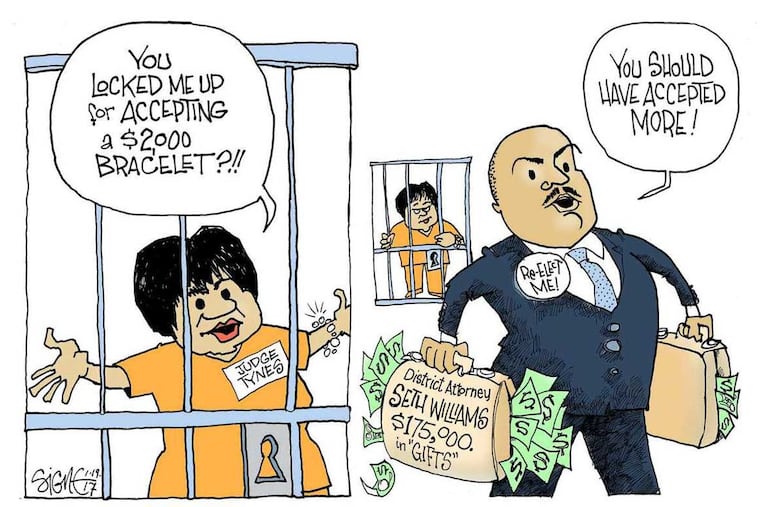Inquirer Editorial: Serial ethics lawbreaker Williams shouldn't be district attorney

It's hard to see how anyone can have faith in Philadelphia District Attorney Seth Williams' ability carry out the duties of his office now that he is an admitted serial lawbreaker.
Tuesday's record $62,000 fine from the city Ethics Board for arrogantly concealing $175,000 in gifts confirms that Williams has violated the trust of this city.
He knew he was wrong to hide gifts ranging from home repairs to exotic vacations; not only because he is the city's chief law enforcement official but because he has prosecuted people for similar violations.
After former Attorney General Kathleen Kane derailed a state investigation of several Democratic lawmakers and a Traffic Court judge who took cash and jewelry from an undercover informant, Williams picked up the task and secured guilty pleas.
Just like him, his targets failed to report gifts. But they took much less. Their gifts ranged from $1,500 to $8,750. Williams was far more grandiose. He took tickets to Phillies and 76ers games; sideline passes to Eagles games; $40,000 in home repairs, including a new roof; and expensive vacations to Caribbean resorts.
The gifts came from lawyers and contractors; people who may have had ulterior motives for seeking the district attorney's goodwill and could directly benefit if the favors to Williams were returned.
When Williams first came clean in August, he "forgot" to report an additional $15,000 in cash he had received, including $2,500 from defense lawyers whose clients had cases handled by his office. He reported the gifts only after the FBI took an interest in his campaign account.
Williams has shattered the confidence of people who believed his claim to be a reformer. His sleazy behavior has tossed mud on any accomplishments he made as district attorney.
Williams, who is in the midst of a reelection campaign, should instead have the good grace to resign. His blatant violation of the law disqualifies him from serving as the city's chief law enforcement officer.
The point of Philadelphia's ethics law is to ensure that public officials put the public first in their official capacities. Williams didn't do that.
Recreating the Ethics Board in its current form was a big step forward a decade ago, but the Williams case shows it's time to go a step further.
Current law allows unlimited cash gifts from people who apparently would not be affected by the office but bans cash gifts from anyone who could benefit from the office's actions.
It's time to ban all gifts to public officials, no matter the amount.